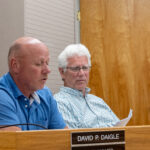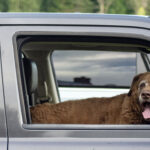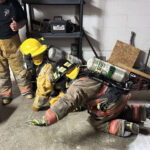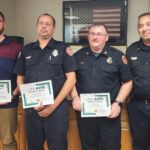The cold hard facts
about home heating oil spills
In Our Back Yard
Courtesy of the state Department of Environmental Protection
OK, the cold hard facts are that winter is here and this is Maine. Like the old saying says, “If you can’t take the winters, then you don’t deserve the summers!”
Our message this month (as it always is this time of year) is pretty short and simple — oil tank spill prevention. For some time we have talked about the problem with leaking above-ground home heating oil tanks and the groundwater contamination and indoor air quality problems that can arise when they leak. So you should know that you do not want an oil spill or leak from your home heating oil tank.
But you may not know that the Department of Environmental Protection (DEP) responds to over 450 home heating oil spills a year at single family residences, and winter is the worst season. The number one cause of oil spills at single family residences for the first four months of the year is termed “Accident – Physical Damage”. This almost always means snow and ice falling off the roof and damaging the oil filter that sticks out from the end the tank, allowing a leak or a spill. This also makes the first four months of the year the ones with the most spills. So if your tank is in the glide path of one of those roof avalanches that come with a spell of warm weather, then beware – you may become a statistic this year!
How can your prevent this? Ask your licensed oil technician to install a “filter protector” to protect both the environment and your precious investment in heating oil. This little gem sits over your fuel filter like those mini A-frames some folks put over their favorite ornamental lawn plants in the winter. It’s the same idea, just a little different shape. You can see what they look like by going to the website www.mainedep.com and clicking on “Filter protectors”.
Better yet, you could get your whole heating oil tank system gussied up to meet the state codes required by the Maine Fuel Board in the Department of Professional and Financial Regulation. This includes replacing any unprotected underslab or buried piping, installing the tank on a firm foundation, and protecting outside tanks from the previously mentioned overhead dangers.
For a short spill prevention checklist of your tank system, call the Maine DEP at 1-800-452-1942 and ask for the pamphlet “Is Your Tank in Shape?” You can also check out the link on www.mainedep.com to see the checklist, pictures of filter protectors and the Fuel Board rules.
This article was submitted by David McCaskill, a senior environmental engineer with the Maine DEP Bureau of Remediation and Waste Management. E-mail your environmental questions to infodep@maine.gov or send them to In Our Back Yard, Maine DEP, 17 State House Station, Augusta, ME 04333.







